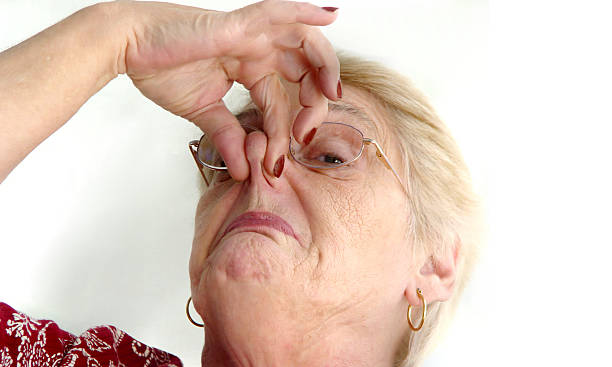By Deborah Bamisaye
Folu and his mum went visiting a family friend. On their way home, walking right beside her, Folu called, “Mummy?” “Yes!” Came the response. “My Grandma is cool!” “Cool? How?” She asked. “Yes, she is! She doesn’t smell! Didn’t you notice that Rita’s Grandma was smelling? That was why I left the room to play with her brother outside, I wonder…” “Haa Foluuu!” Cried his Mum, before he could finish his sentence. He then continued, thinking his Mum was buying the story. “I wonder how you managed to…” Mum cuts in sharply this time, “Shut up! Shut your dirty stinky, smelling mouth! Oh my God! In our culture, it is a taboo to say an adult is smelling especially coming from someone your age. Don’t worry, I’m going to report you to your Dad and your cool Grandma today, just wait and see;” She concluded. “I’m so sorry Mum, please…” (Folu begged but his words fell on deaf ears.)
The Question is: Why do Some Grandmas Smell?
Some grandmas smell distinctively due to age-related chemical changes in their skin oils, combined with hormonal, medical and environmental factors, all of which are normal aspects of aging rather than signs of neglect or poor hygiene.
Now, let’s take the conversation a little further.
The distinct “smell of some grandmas” or what is often called the “old person smell” mainly comes from a natural chemical compound called 2-nonenal. As people age, their skin produces more 2-nonenal due to the oxidation of omega-7 unsaturated fatty acids in skin oils. This compound has a characteristic grassy, greasy or slightly musty scent and is unique to older adults, typically starting to appear more noticeably after age 40.
Other factors contributing to this smell include:
– Changes in skin gland function and sweat composition with age.
– Hormonal changes (such as menopause) that affect sweat and oil production.
– Medications that older adults often take, which can alter body odour.
– Diet and metabolism changes, which can intensify body odors.
– Reduced hygiene ability due to mobility or cognitive decline in some elderly individuals.
– Environmental odors transferring to clothes and skin in their living spaces.
This smell is not due to poor hygiene; it’s a natural byproduct of the aging process and skin chemistry. Importantly, 2-nonenal is ‘not easily washed away’ because it is not water soluble, so it can linger on the skin and fabrics even in clean conditions.
Medication & Health Condition
Do you know that – medications and health conditions can contribute to the distinct body odour associated with some grandmas and older adults?
– Many older adults take multiple medications, some of which can cause dry mouth, changing oral bacteria and leading to bad breath or altered body odour. Dry mouth reduces saliva, which normally helps wash away bacteria causing odour.
– Certain medications, such as anticholinergic drugs (for overactive bladder, allergies, Parkinson’s), some psychiatric medications (antidepressants, antipsychotics), and cancer treatments, can affect sweating patterns and skin chemistry, which may change body odour as well.
– Health conditions like diabetes, kidney disease, liver disease, Parkinson’s, and gum disease can produce distinctive smells due to metabolic changes or toxin buildup, potentially influencing a person’s overall scent.
– Additionally, underlying diseases or treatments can impact sense of smell or cause unusual odours through changes in body chemistry.
So, we can say that, aside from natural age-related skin chemistry changes (like increased 2-nonenal), medications and health conditions often play a significant role in creating or modifying the body odour seen in many older adults.
Diet and Lifestyle Influencing the Scent of Elderly Individuals
Dietary Factors Contributing to Body Odour in Grandmas and Grandpas
– Sulfur-rich Foods: Consuming foods like garlic, onions, cruciferous vegetables (broccoli, cabbage, Brussels sprouts, cauliflower), and certain spices (curry, cumin, fenugreek) can increase body odor in elderly individuals. These foods contain volatile compounds or sulfuric acids that are absorbed and excreted through the skin, contributing to a stronger or more distinct scent.
– Red Meat: Diets high in red meat are linked to more intense, less pleasant body odour, as sweat from red meat eaters interacts with skin bacteria to produce stronger odour.
– Seafood: For those with metabolic conditions like trimethylaminuria, seafood can trigger a fishy body odour, as specific compounds are released and not properly metabolized.
– Alcohol: Alcohol consumption can alter mouth bacteria, contribute to dehydration, and release acetate through sweat, all of which heighten body and breath odour.
– Medication and Metabolism: Some medications and chronic health conditions also alter body chemistry, potentially increasing body odor independently or in combination with diet and lifestyle factors.
Effect of Aging on Smell and Odour
Aging significantly affects the sense of smell (olfaction), the decline typically begins after the seventh decade of life (70years old) and results in both reduced sensitivity to odours and diminished ability to discriminate between different smells.
Dr. Osaigbovo Onaiwu (University of Benin Teaching Hospital, Benin City) and others addressing issues of body odour in the general population, have often emphasized hygiene and oral health, but not specific on the senile odour topic.
There are also local studies addressing general causes of bad body odour – including bacteria, hygiene, and medical conditions but do not isolate age as a factor.
Do you know that more than 75% of people over 80 are experiencing major olfactory impairment? So, can anything be done to curb it?
Stopping the Smell
Age-related body odour is natural but can be significantly reduced by combining targeted hygiene, dietary adjustments, healthy lifestyle habits and when needed, consultation with healthcare professionals for management of underlying causes or medication review.
Additional steps you can take:
1. Personal Hygiene Upgrades
– Daily cleansing: Bathe or shower with a gentle, pH-balanced or acidified soap, paying extra attention to sweat-prone areas (armpits, groin, feet, skin folds). This helps wash away odour-causing compounds that cling to the skin.
– Gentle exfoliation: Use a soft washcloth or mild scrub a few times a week to remove oxidized oils and dead skin cells.
– Fresh clothing daily: Change into clean clothes daily and avoid rewearing garments, especially undergarments and socks.
– Clean beddings and towels regularly: Launder bed linens and towels at least once a week to prevent odour transfer and accumulation.
2. Skin Care for Odour Control
– Moisturize regularly: Apply unscented moisturizers after bathing to help keep skin healthy. Healthy skin is less prone to holding onto odour molecules.
– Specialized deodorant/body washes: Choose products designed to neutralize 2-nonenal, such as those containing lactic acid, mandelic acid, or targeted enzymes for odour reduction.
3. Dietary Improvements
– Limit odour-promoting foods: Reduce consumption of strong-smelling foods like onions, garlic, cruciferous vegetables (e.g., broccoli, cabbage), red meats, and spicy foods, as these can intensify body odour.
– Stay hydrated: Drink adequate water daily – hydration helps flush out odour-causing compounds from the body. Drink water the right way. Check out the next edition for that.
– Eat more mushrooms and vegetables: Mushrooms, in particular, may help neutralize age-related odour. A diet rich in fruits and vegetables provides antioxidants that reduce skin oxidation.
4. Lifestyle and Environmental Measures
– Ventilate your living space: Open windows regularly and expose clothes and bedding to fresh air to prevent musty odours from accumulating.
– Physical activity: Engage in moderate exercise to support healthy skin and proper sweat gland function.
– Manage stress: Lowering stress reduces oxidative changes in skin, which in turn minimizes odour formation.
5. Address Medical and Medication Factors
– Review medications: Some medications may affect body odour. The aged should discuss with a healthcare provider to see if alternatives are possible.
– Manage health conditions: Properly controlling chronic diseases such as diabetes, kidney, or liver disorders can help reduce associated odours.
– Consult a healthcare professional: If you notice sudden, strong, or uncharacteristic body odour, seek medical advice, as this can sometimes signal an underlying health issue.
It will not be wrong to conclude that: odour is influenced by what is consumed, levels of physical activity, skin hygiene, hydration, and the overall living environment. Shifts toward diets low in sulfurous foods and red meat, increased intake of mushrooms and hydrating fruits/vegetables, regular exercise, and diligent personal hygiene can help manage changes in scent associated with aging.





